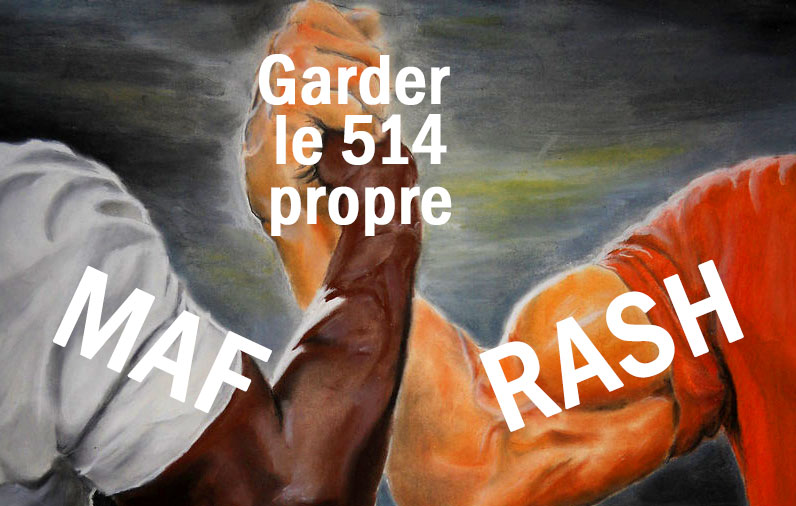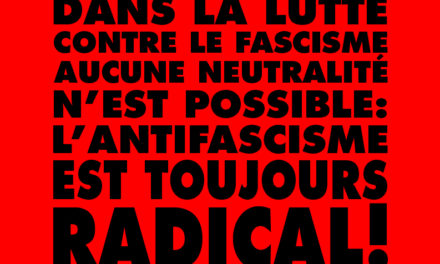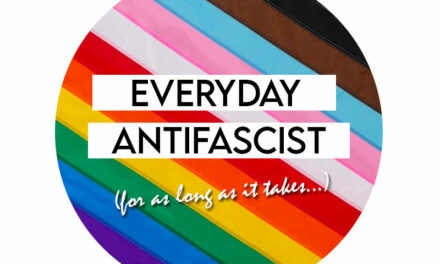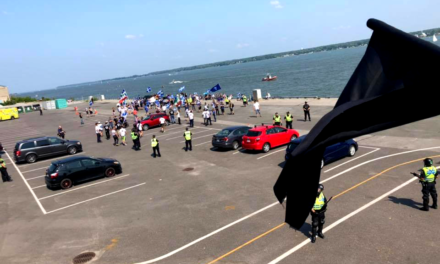Members of the Montréal Antifasciste collective gave an interview to RASH-Montréal & Dure Réalité for issue #16 of the Casse Sociale zine (October 2023).
///
CS: Could you briefly explain the origin of the Montréal Antifasciste collective?
MAF: Montréal Antifasciste is a grassroots activist collective that was created in the spring of 2017 in response to the rise of organizations like La Meute that were publicly advancing xenophobic and Islamophobic rhetoric in the context of a populist opposition to public policies on immigration and welcoming refugees.
As the collective’s name suggests, it is part of the historical anti-fascist movement and draws inspiration from its militant anti-racist and anti-fascist predecessors, including Anti-Racist Action (USA and Canada, 1990s), Anti-Fascist Action (UK, 1980s), and other similar organizations in Europe, notably in France and Germany. We’re also part of the broader contemporary anti-fascist resurgence that has arisen in recent years in response to Donald Trump’s presidency and the rise of the alt-right and far-right populism. The collective brings together activists from three generations who are also active in various other struggles.
CS: What is your link with RASH?
MAF: We have what you might call an “organic” link with RASH. This is not just the case with the anti-racist skin or RASH milieu, however, but with many circles that have a natural affinity with the collective’s political principles. We’re close to certain student and union circles, the radical queer community, the anti-racist supporters of CF Montréal, anti-racist counter-cultural currents, and others. In short, we’re part of an anti-racist milieu that very much shares our principles. We’re also in constant communication and collaboration with comrades in other regions of Québec, notably Québec City, Saguenay, the Eastern Townships, and Gaspésie. It’s important to point out that this broader anti-racist/anti-fascist milieu, of which RASH is a part, existed long before MAF was founded, and that these links are rooted in longstanding solidarities and militant action that have continued to this day.
CS: You’ll be at Rev Fest 2023, and you’ve taken part in the past. Why do you attend this kind of event?
MAF: To begin with, it’s a milieu that’s already very committed to our ideas. Beyond that, however, it’s always been a central part of the activities of anti-racist and anti-fascist movements to take over cultural spaces that are contested by the far right. Alternative music scenes—particularly the punk scene—have often been contested environments, particularly in the 1980s and 1990s. In Montréal, this may seem less obvious today precisely because these spaces were literally cleansed of far-right influence in the years 1990 to 2000 and thereafter. The boneheads were pushed out ages ago, and there’s virtually no space left where they can even attempt to rear their ugly heads. We’re among those who believe it’s essential to continuously occupy these cultural spaces and politically claim them for the anti-racist camp.
CS: At times we’ve seen a tendency towards depoliticization in certain circles, as if there were something inherently noble in being apolitical. So this idea of taking these milieus back from the far right and politicizing them with the support of or against the will of the participants is an interesting one! Are you also trying to be present or to act in circles that are less committed to anti-fascism, and do you want expand the movement beyond its current boundaries?
MAF: To answer this question honestly, we need to recall a little of MAF’s history. In the beginning, it was really a coalition of different groups representing an important part of the Montréal anti-capitalist and anti-racist movement. At the outset, there was a very clear desire to participate in the emergence of a much broader anti-racist social movement, and this was one of the explicit aims of the project. This is what gave rise, for example, to the series of major anti-racism demonstrations in the 2017 to 2019 period. Montréal Antifasciste was very involved in organizing these demonstrations, but these spaces, which are based on coalition work, are often difficult to maintain over time. The same can be said for the broader movements we’d like to see emerge. It requires hard work.
Montréal Antifasciste began as a coalition but over time has become a collective that engages in a fairly specific range of activities and deploys its (limited) forces as it sees best. MAF has developed and maintained a particular expertise regarding surveillance of the far right, publishing the information it gathers, using its website and social media in particular. However, the other key element—the coalition work, the movement building, and making inroads into new spaces, all of which is extremely important—has been somewhat “elusive,” as it were, because we have been effectively putting the collective’s energy elsewhere, and nobody else really took up this task. Attempts to organize major anti-racist demonstrations in recent years, for example, have come to nothing, because everyone’s too busy doing their own thing! It’s an undertaking that needs to be resuscitated. MAF, insofar as it is able, would be delighted to join forces with other groups or organizations to gain a foothold in spaces that are not already held and move in the direction of movement building, but this is something we certainly can’t do on our own.
C: What is it that the collective does concretely?
MAF: First and foremost, we try remain as representative as possible of the militant and anti-capitalist community. We also try organize public and semi-public events, even if we are only able to do so periodically. In 2023, for example, we organized a book launch for a book on the history of Anti-Racist Action (we’d already done several similar events in the past), and we inaugurated an anti-fascist library fund at DIRA, among other things. We also hold five or six public events a year. We table several times a year at various cultural or political events, such as Rev Fest, the Montréal Anarchist Book Fair, Black Flag Combat Club events, and other festivals. We hand out pamphlets, chat with participants, distribute “visibility” material at reduced prices or free of charge, and sell a bit of merch to finance our activities. We also sometimes call for public rallies, as we did last spring in front of the Palais de Justice to draw attention to the trial of neo-Nazi Gabriel Sohier Chaput, aka “Zeiger.”
Then there’s a whole other aspect, which is essentially intelligence work, consisting of a more “behind-the-scenes” tracking of various far-right groups and trends, specifically in Montréal, but also elsewhere. In this work, we actively exchange information with comrades in other regions and with collectives based elsewhere in Canada, the United States, and Europe. When, on a case by case basis, we deem it necessary, we attempt to create an all-encompassing overview of the emergence and evolution of certain far-right circles. In recent years, we’ve done this most frequently with neo-fascist movements like Atalante, which we’ve followed from start to finish. We also try to keep up with new trends, which in the last year includes White Lives Matter and the Active Clubs, both neo-Nazi, and the emergence of Nouvelle Alliance, which is trying to gain a certain respectability in nationalist circles but is, in fact, rooted in identitarian ultranationalist networks and directly replicates the practice of neo-fascist formations like Atalante.
Finally, based on our research, observations, and reading of the current situation, we occasionally produce more in-depth analytical texts. We invite readers who would like to know more to read “The Current Situation of the Far Right in Québec in 2023” (https://montreal-antifasciste.info/en/2023/06/28/the-current-situation-of-the-far-right-in-quebec-in-2023/).
CS: What are the hottest issues at the moment?
MAF: Aside from what we’ve mentioned so far, what’s been occupying much of our time in recent months is the whole homophobic/queerphobic/transphobic backlash, which first manifested itself through the involvement of characters associated with anti-vaxx conspiracy theory circles. After the health measures were, to all intents and purposes, lifted, many conspiracy theory leaders looked for other causes to keep their followers’ attention. What we’re seeing is the importation of the dominant themes of the US far right, which often pass through English Canada, only to end up in Québec a few months later. The “fascist flavor of the month” that arrived here last spring is the groomer panic, which originated in American far-right circles and can even be traced back to the historical Nazis. It’s the conspiratorial obsession that the hidden intention of LGBTQ+ movements is to groom children in various ways for sexual exploitation. Consequently, for them, any form of policy or practice focused on education meant to encourage tolerance, equity, diversity, and inclusion—even in an entirely mainstream liberal context—is necessarily part of a child perversion agenda.
As a result, the conspiracy theorists grouped around anti–health measures activist François Amalega wanted to organize a series of protests starting in April, against drag queen story hours in public libraries, for example, and more recently against an exhibition on gender diversity at Québec’s Musée de la civilisation. The queer and trans anti-fascist community led a solid resistance movement against this backlash, in which Montréal Antifasciste played an active part; for each far-right event, there was a counter-event, and we collectively succeeding in routing Amalega’s organization over the course of the summer. A new development on this front, however, is the participation of organized groups from the Muslim community and religious networks. Across the country, but particularly in Montréal, what we’re seeing is these groups now joining forces with Christian fundamentalists and conspiracy theorists from the so-called “Freedom Convoy” in an offensive against LGBTQ+ rights, even directly attacking sex education, very often with clear homophobic ulterior motives. This is obviously forcing us to analyze these movements in greater depth and to adapt our future responses accordingly. This is the most salient issue at the moment.
CS: There really are a lot of anti-fascist stickers in Montréal; it’s amazing. Can you tell me a bit about the point of wallpapering the city like that?
MAF: Thanks for asking! It’s true that it’s a particularity of Montréal, whether it’s stickers, posters, collages, or graffiti; think of the NTFA collective’s tags, for example. It’s one of the things our milieu makes good use of. We’ve noticed that this wallpapering of the city creates a kind of psychological hegemony. We sometimes get messages from people from elsewhere who are passing through Montréal and think it’s really cool that there are stickers on every wall and every street corner. It’s a way of marking our territory and letting the far right, our political opponents, know that they’re on hostile territory.
In fact, I think it’s important to mention that one of the things we can be proud of is that Montréal is a major metropolis of almost two million inhabitants where there is no organized neo-Nazi presence prepared to show its face in public. There are few cities of this size where that is the case, and we played a role in creating this environment. There are Nazis in Montréal, as there are everywhere, and there always will be people who embrace this ideology, but here they don’t regularly go out in public, because they know that if they do it’s going to end badly for them. In this respect, our collective, with its allies and supporters, is helping to ensure that Montréal remains a resolutely anti-fascist city.





![[FAIL] The Time the Far Right Tried to Spread a Phony Denunciation of Sexual Assault](https://montreal-antifasciste.info/wp-content/uploads/2018/06/fail_fake-440x264.png)